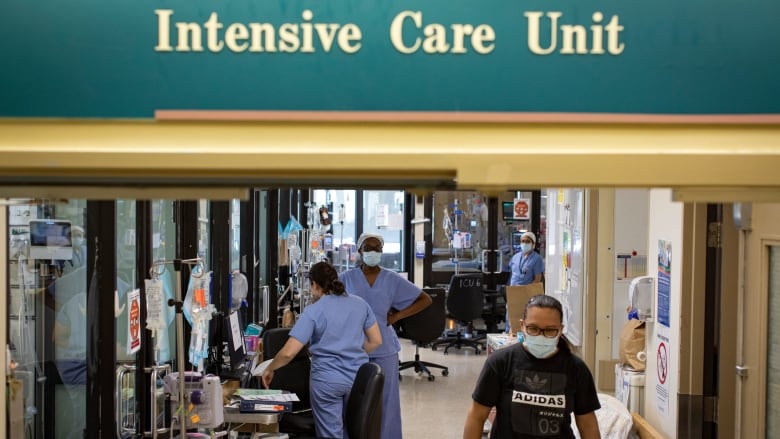Ontario reports 4,362 COVID-19 cases and 34 deaths on Saturday
Province says number of people in hospital in Ontario has reached a new high of 2,065

Ontario reported 4,362 new COVID-19 cases and 34 more deaths on Saturday, as new restrictive measures came into effect in a bid to stem the exponential rise in cases.
The latest provincial modelling data projects that Ontario could see more than 10,000 new cases per day by late May.
Dr. Kali Barrett, a critical care physician who is also a member of the science advisory table secretariat, called the projections "unthinkable" and "catastrophic."
Saturday's cases are down from a record-high of 4,812 on Friday — a slight reprieve after three straight days of new peaks. However, the seven-day average continued to climb, reaching 4,370 on Saturday, a slight increase from 4,292 on Friday.
The latest figures include 1,162 in Toronto, 936 in Peel Region, 430 in York Region, 251 in Ottawa, and 301 in Durham, according to Health Minister Christine Elliott.
Elliott said 3,751,316 COVID-19 vaccine doses have been administered in Ontario as of 8 p.m. on Friday.
Hospitals continue to fill with COVID-19 patients
On Saturday, Public Safety Minister Bill Blair said the federal government has approved a request from Ontario to extend the deployment of two mobile health units in the province until at least the end of June.
The military-style field hospitals are deployed at the Sunnybrook Health Sciences Centre in Toronto and Hamilton Health Sciences and will remain there until June 30.
The federal government made the decision to help Ontario combat the rising numbers of COVID-19 cases and curb the spread of variants of concern, Blair said in a tweet.
"We continue discussions with the province and our partners on how we can keep supporting the people of Ontario as we get through this pandemic," Blair said.
We continue discussions with the province and our partners on how we can keep supporting the people of Ontario as we get through this pandemic.
—@BillBlairOn Saturday, the number of people in hospital with COVID-19 in Ontario increased by 110 to a new high of 2,065.
The province says 725 people are in intensive care units with a COVID-related illness, 501 of whom are on ventilators.
On Friday, Premier Doug Ford stepped up provincial restrictions, extending the stay-at-home order for a minimum of six weeks. The current order is valid until May 20.
He continued to reject expert calls for paid sick days — despite modelling showing that cases will remain high through the summer without additional support for essential workers.
Cases of COVID-19 are rising in most of the province's 34 public health units, and the province-wide test positivity rate has climbed to 7.9 per cent. That figure is higher than 10 per cent in Toronto, Peel and York regions.
"We're losing the battle between the variants and vaccines," Ford said on Friday. "We're on our heels."
During a live call-in radio special hosted by CBC Radio, Dr. Peter Jüni, the science director of the province's COVID-19 advisory table, said the new restrictions show that the province doesn't understand how the COVID-19 virus spreads.
"It doesn't make sense to blame packed patios. It doesn't make sense to blame parks or playgrounds if the problem is that indoor spaces are just notoriously unsafe," he said on Saturday.
Initially, the province said all outdoor playgrounds, play structures and equipment were not to be used, but in a tweet on Saturday afternoon, Ford said the government will roll back restrictions on playgrounds to allow their use.
Jüni said the way to get the numbers down is to close everything that is not essential work and to implement paid sick leave for essential workers.
"This is not rocket science," he said. "Those who really need to be out there to get the work done, they need to be supported."
Jüni said the government needs to restrict indoor spaces, and for that to happen, he said public outdoor spaces need to be open.
Asked how he feels as an adviser when advice from medical experts is not followed by the province, Jüni said: "Yesterday was one of the darkest days in my professional career and also personally.
"What is needed is that we just all focus on what every single one of us can do...every single one can contribute to interrupting the transmission."
Ontario walks back policing powers
Ontario's government walked back some of its new policing powers one day after they were announced, now only allowing police to stop vehicles or people if they are suspected of participating in an organized public event or social gathering.
On Friday, Ford had given police the authority to ask people outside their residences to indicate their purpose for leaving home and provide their addresses. That included stopping vehicles at random and potentially issuing tickets of about $750.
In a statement Saturday, Solicitor General Sylvia Jones said officers will no longer have the right to stop any pedestrian or vehicle to ask why they are out or request their home address.
"If a police officer or other provincial offences officer has reason to suspect that you are participating in an organized public event or social gathering, they may require you to provide information to ensure you are complying with restrictions," Jones said
The change came after several police services across Ontario took to social media on Friday saying they won't comply with the new powers to stop people and question their reason for leaving home.
As of Saturday morning, the services who had said no to random checks included police services in Toronto, Peterborough, Niagara, Waterloo, Peel Region, Ottawa, Hamilton, Halton, Brantford and London.
The London Police Services Board released a statement saying it had "serious concerns" about whether the provincial government's expanded police powers are even constitutional.
"We cannot enforce our way out of the pandemic," Dr. Javeed Sukhera, the board's chair, said in a statement released Saturday.


